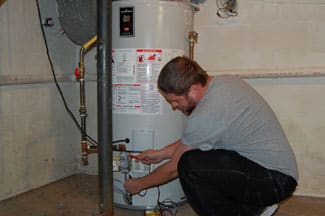Everyone has got his or her own piece of advice with regards to Common Problems with Tank Water Heaters.

Imagine beginning your day without your routine hot shower. That currently sets a poor tone for the rest of your day.
Every home needs a reliable water heater, yet only a few understand exactly how to handle one. One simple means to keep your hot water heater in leading form is to check for faults frequently as well as fix them as quickly as they show up.
Keep in mind to switch off your hot water heater before smelling about for faults. These are the hot water heater faults you are more than likely to come across.
Water too warm or too cold
Every water heater has a thermostat that figures out how hot the water gets. If the water entering your house is as well hot in spite of setting a convenient maximum temperature, your thermostat may be defective.
On the other hand, too cold water may be due to a fallen short thermostat, a broken circuit, or inappropriate gas flow. As an example, if you utilize a gas water heater with a damaged pilot light, you would get cold water, even if the thermostat is in perfect condition. For electrical heating systems, a blown fuse may be the offender.
Inadequate warm water
Hot water heater been available in lots of dimensions, depending upon your hot water demands. If you lack warm water before everyone has had a bathroom, your hot water heater is too small for your family size. You must think about setting up a larger water heater tank or opting for a tankless hot water heater, which occupies less room and also is a lot more resilient.
Weird noises
There go to the very least five type of sounds you can hear from a hot water heater, yet one of the most typical analysis is that it's time for the hot water heater to retire.
First off, you must recognize with the regular sounds a hot water heater makes. An electrical heating system might seem different from a gas-powered one.
Popping or banging noises usually mean there is a slab of sediment in your tanks, and it's time to clean it out. On the other hand, whistling or hissing noises may just be your valves allowing some pressure off.
Water leaks
Leaks could originate from pipes, water connections, shutoffs, or in the worst-case scenario, the tank itself. Over time, water will certainly wear away the container, as well as locate its way out. If this happens, you require to replace your hot water heater immediately.
However, prior to your change your entire storage tank, be sure that all pipes remain in location which each valve works flawlessly. If you still need assistance identifying a leak, call your plumber.
Rust-colored water
Rust-colored water suggests among your water heater elements is worn away. It could be the anode rod, or the container itself. Your plumber will certainly be able to identify which it is.
Lukewarm water
Regardless of just how high you established the thermostat, you will not obtain any kind of hot water out of a heater well past its prime. A water heater's efficiency may decrease with time.
You will also get warm water if your pipelines have a cross link. This indicates that when you switch on a tap, hot water from the heater flows in alongside normal, cold water. A cross link is simple to spot. If your warm water taps still follow shutting the hot water heater valves, you have a cross link.
Discoloured Water
Rust is a significant reason for dirty or discoloured water. Deterioration within the water tank or a failing anode rod could cause this discolouration. The anode rod shields the container from rusting on the within and must be inspected yearly. Without a pole or an effectively functioning anode rod, the warm water rapidly wears away inside the tank. Get in touch with a specialist water heater specialist to establish if changing the anode rod will take care of the trouble; otherwise, change your hot water heater.
Verdict
Preferably, your hot water heater can last one decade prior to you require an adjustment. Nonetheless, after the 10-year mark, you might experience any one of these mistakes a lot more on a regular basis. Now, you must add a new hot water heater to your spending plan.
How To Troubleshoot 3 Common Water Heater Problems in Twin Cities
The Water Heater Is Leaking
A leaky cold water inlet valve A loose pipe fitting A leaky temperature and pressure relief valve A corroded anode rod A cracked tank Turn Off Your Water Heater:
Shut off your gas water heater by turning the gas valve on the unit to the “OFF” position. Shut off your electric water by switching its power off at your electrical panel. Look for a two-pole breaker labeled “water heater” and turn it to the “OFF” position. Move the ball valve connected to the water heater to be perpendicular to the piping at a 90° angle. Look for the Leak:
Depending on whether the water is coming from the tank's top or bottom, you’ll want to look for the leak in different locations.
If the leak comes from the top of the tank, carefully look for water escaping from the cold water inlet valve or loose pipe fittings. Rusted hot and cold water valves can have loose connections with the tank, with water leaking out of them.
https://mspplumbingheatingair.com/blog/how-to-troubleshoot-3-common-water-heater-problems
We were shown that editorial on Common Problems with Your Home Water Heater through an associate on our other web page. Sharing is caring. Helping others is fun. Thanks for going through it.
Click Here To Find Out More